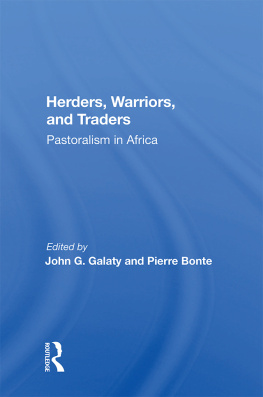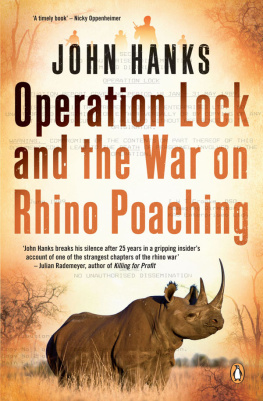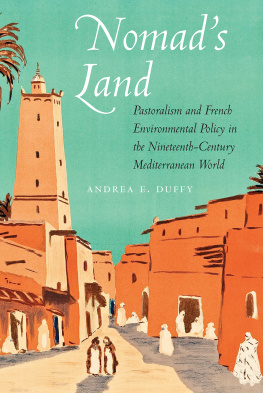Herders, Warriors, and Traders
African Modernization and Development Series
Paul Lovejoy, Series Editor
Herders, Warriors, and Traders: Pastoralism in Africa, edited by John G. Galaty and Pierre Bonte
South Africa's Labor Empire: A History of Black Migrancy to the Gold Mines , Jonathan Crush, Alan Jeeves, and David Yudelman
Children of Ham: Freed Slaves and Fugitive Slaves on the Kenya Coast, 1873 to 1907, Fred Morton
The Black Man's Burden: African Colonial Labor on the Congo and Ubangi Rivers, 1880-1900, William J. Samarin
Psychoses of Power: African Personal Dictatorships, Samuel Decalo
African Cities in Crisis: Managing Rapid Urban Growth, edited by Richard E. Stren and Rodney R. White
Patriarchy and Class: African Women in the Home and the Workforce, edited by Sharon B. Stichter and Jane L. Parpart
The Precarious Balance: State and Society in Africa, edited by Donald Rothchild and Naomi Chazan
Herders, Warriors, and Traders
Pastoralism in Africa
Edited by
John G. Galaty and Pierre Bonte
First published 1991 by Westview Press, Inc.
Published 2018 by Routledge
52 Vanderbilt Avenue, New York, NY 10017
2 Park Square, Milton Park, Abingdon, Oxon OX14 4RN
Routledge is an imprint of the Taylor & Francis Group, an informa business
Copyright 1991 Taylor & Francis
All rights reserved. No part of this book may be reprinted or reproduced or utilised in any form or by any electronic, mechanical, or other means, now known or hereafter invented, including photocopying and recording, or in any information storage or retrieval system, without permission in writing from the publishers.
Notice:
Product or corporate names may be trademarks or registered trademarks, and are used only for identification and explanation without intent to infringe.
A CIP catalog record for this book is available from the Library of Congress.
ISBN 13: 978-0-367-01575-6 (hbk)
To the memories of
Suzanne Bernus
and
Harold K. Schneider,
friends of African pastoralists
Contents
, Pierre Bonte and John G. Galaty
, Jean Comaroff and John L. Comaroff
, Pierre Bonte
, Douglas H. Johnson
, Neal Sobania
, David Turton
, John G. Galaty
, Abdel Wedoud QuId Cheikh
, Edouard Conte
, Edwin Wilmsen
, John G. Galaty and Pierre Bonte
Guide
- Figures
- Plates: Following Page 180
African pastoralists have been devastated by over twenty years of drought, famine, and dislocation. Images of starving children in the Sahel, lines of refugees in Ethiopia, and dying cattle in the Sudan are familiar to all of us. Why this calamity should have happened, and should continue to happen, is a question addressed by a generation of researchers in anthropology, economics, geography, ecology, and history who have studied African pastoralism in the context of environmental instability, political strife, and social collapse.
International aid agencies, aware of the humanitarian expectations held by a sympathetic public, have invested heavily in the African arid zone since the trans-African drought of the early 1970s. This has, directly or indirectly, stimulated research on all aspects of pastoralism. The effort itself has become world-wide, with scholars from throughout the world carrying out research and exchanging insights concerning the current and historical realities of pastoral communities in Africa.
In the late 1970s, several research and communication networks were created for academics and development personnel involved with pastoralist societies. The Overseas Development Institute in London formed a "Pastoral Network," which publishes the Pastoral Network Papers. At the Maison des Sciences de l'Homme in Paris, the "Equipe cologie et anthropologic des socits pastorales" produced for over a decade until 1989 the journal Production pastorale et societ. And at McGill University in Montreal, the "Commission on Nomadic Peoples," of the International Union of Anthropological and Ethnological Sciences, has published Nomadic Peoples for over a decade; in 1990, the Scandinavian Institute for African Studies in Uppsala took over its sponsorship. The two editors of this book have participated in the groups located in Paris and Montreal and acknowledge the benefits gained from those organizations and the scholars affiliated with them.
In the wake of decolonization, the naive and frustrated developmentalism which ensued, and the complex catastrophes subsequently experienced on the African continent, scholars have increasingly taken cognizance of social and political factors constraining pastoral societies and have become aware of the importance of the indigenous knowledge, goals and interpretations of pastoralists for both scholarship and policy development. National governments and development agencies have tended to view pastoralists in purely economic terms, as livestock producers and resource managers, rather than as human agents within the context of culture and political economy, active within multi-leveled political structures that shape economic and social life at local, regional and national levels. Too often the dialectics between economic practice and social value and between pastoralists and the state have been ignored, as have the regional contexts of ethnic and economic reciprocity and competition and the historical precedents for current responses to drought, social change, and state power.
This volume juxtaposes anthropological and historical perspectives on the political economy of African pastoralists, emphasizing dynamic factors in the emergence and current realities of livestock-based societies in Africa. African social science and historiography have tended to look outward from cities and states, a view that marginalizes pastoralists, the quintessential rural dwellers. This book presents a "pastoralist perspective" that focuses on the interstices, on the rangeland communities, trade routes and social networks which have so influenced the states and markets which lie between them. But the arid and semiarid African savanna not only links regions of sedentary life but is one of the largest zones of human occupation in the world, with its own economic and political fabric.
Contributors to this book represent several disciplines but share a keen sense of the social dimensions of political economy and a scepticism for romantic notions of nomadic life. The book emphasizes the economic variation and diversity found in livestock-keeping societies by considering the linkages between pastoralism and cultivation, hunting, foraging and trade. Given that several economic forms can and are pursued within any given ecological setting in Africa, pastoralism represents a political and ideological as well as an economic practice. Pastoralism is a "commitment," predicated on cultural assumptions embedded within diverse political, economic, religious, and military institutions, which in given regions may cut across distinct communities.
We have attempted to construct the conceptual basis for an understanding of African pastoralists as part of the larger social and historical experience of the regions they inhabit. Key topics include the emergence and evolution of pastoralism in Africa, the interplay of ecology and political history, the expansion of pastoral societies and their influence on the formation of African trade, markets and states, the diversity in pastoral social and political institutions, the colonial experience, and current pastoralist conditions, responses and prospects. The chapters are addressed both to scholars and policymakers, who will continue to have material effect on future developments among pastoralists, who despite crisis and calamity, persist in making the African arid and semi-arid zones their home.










